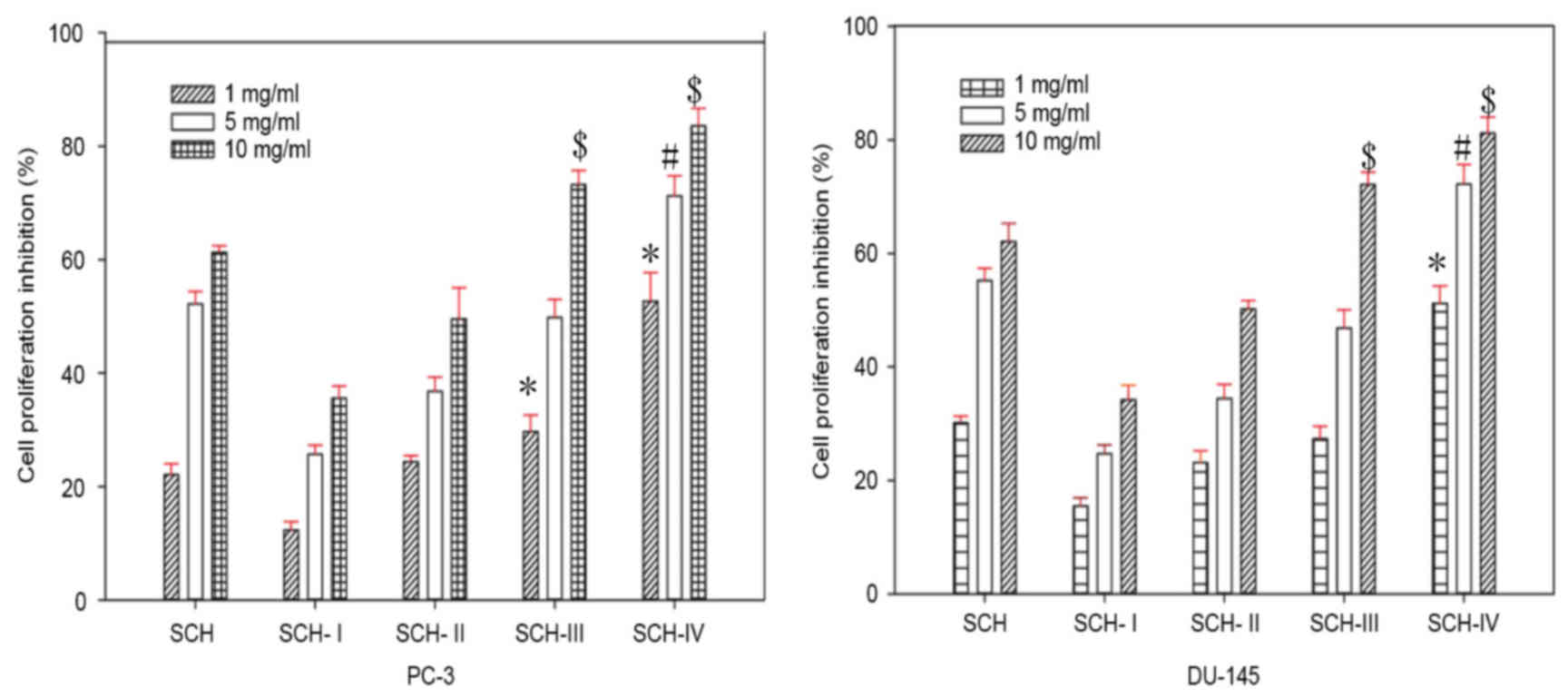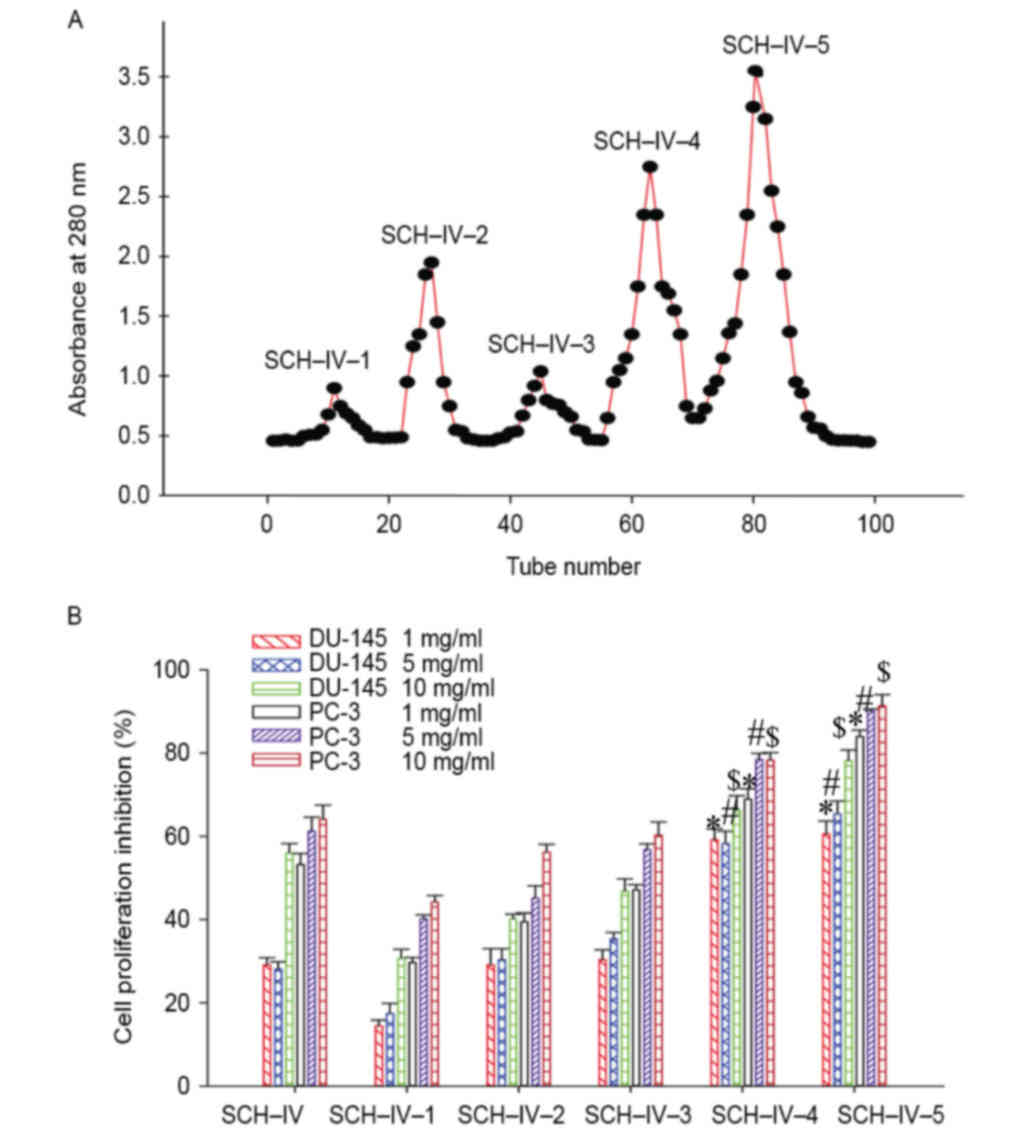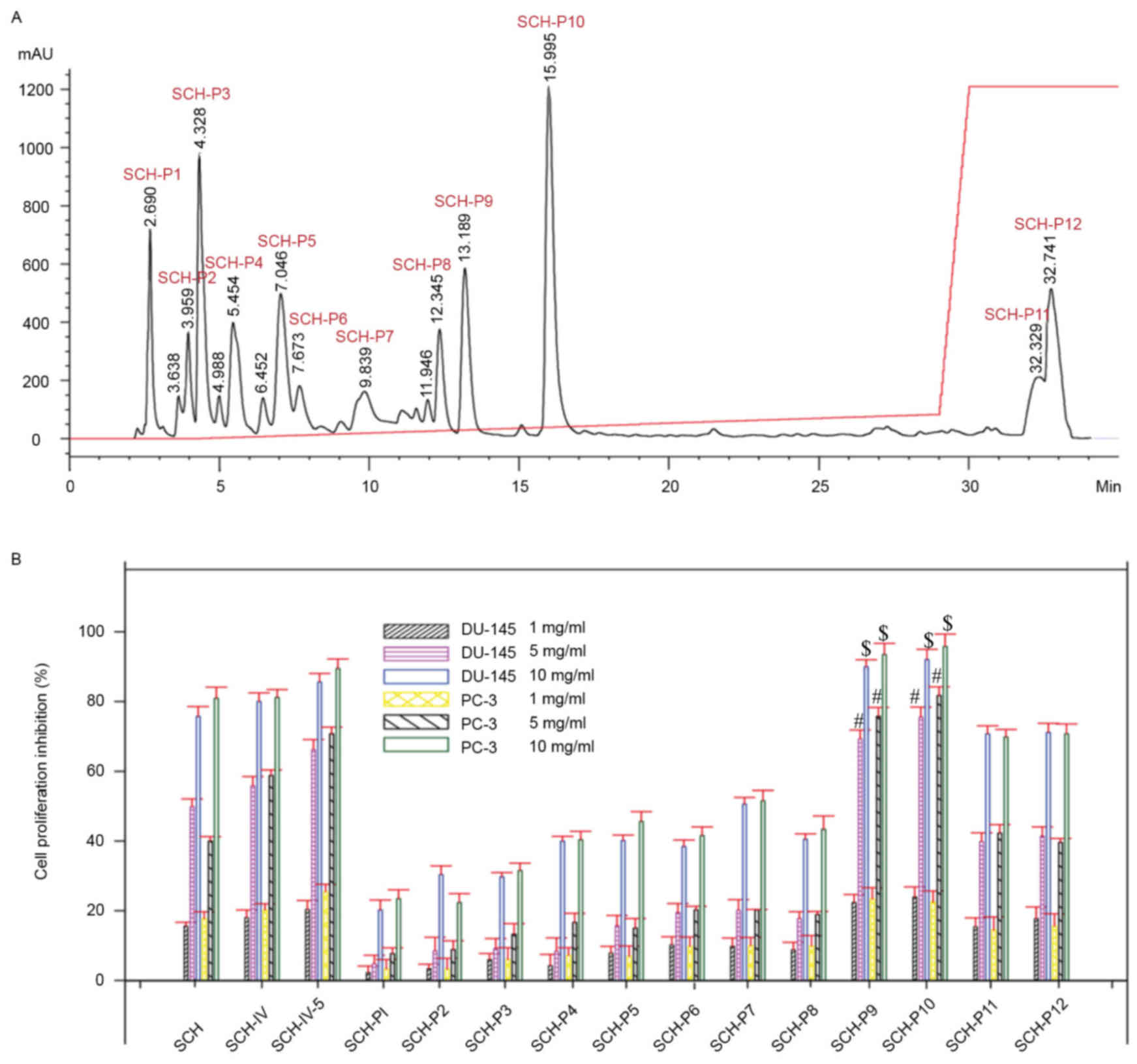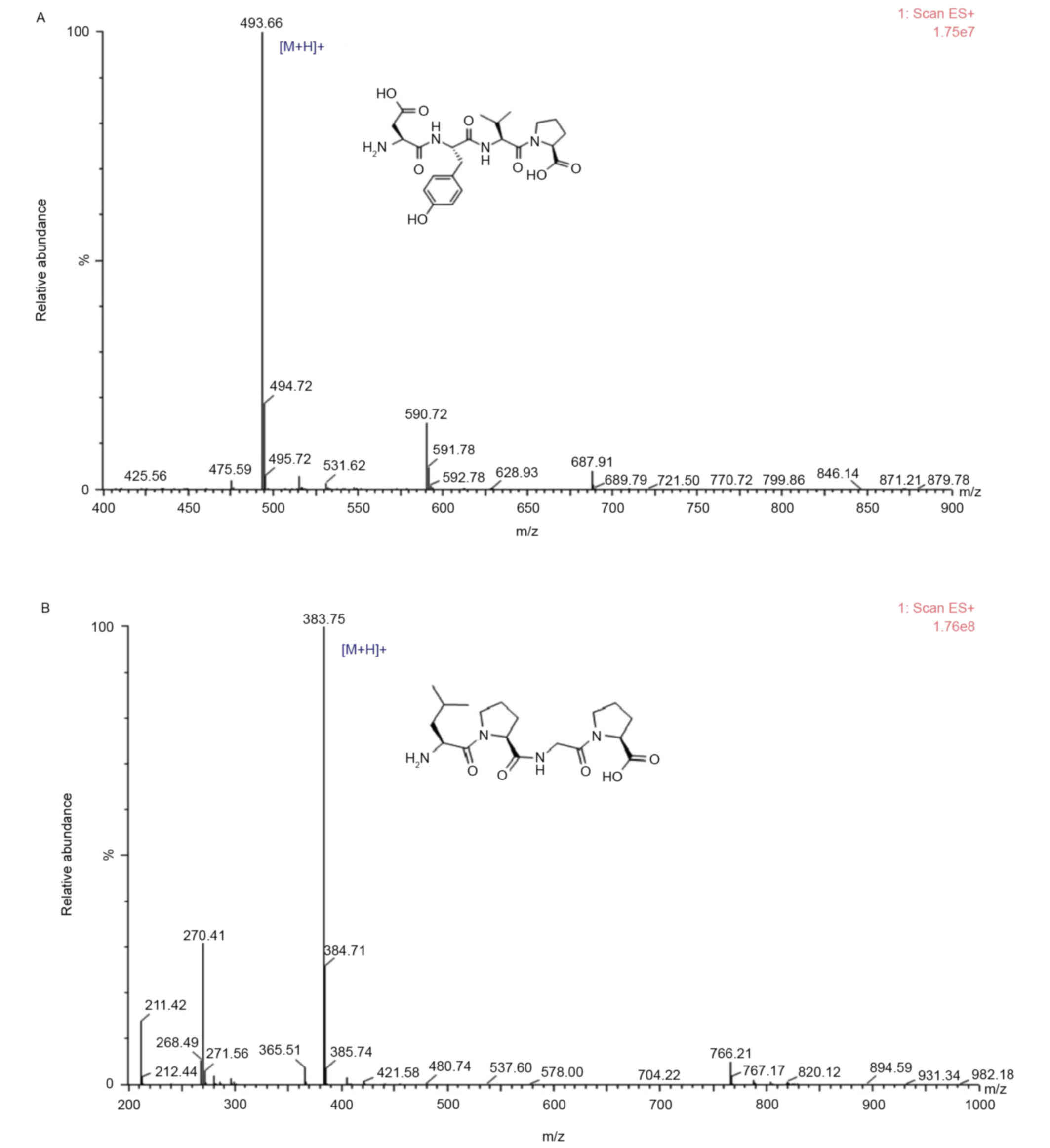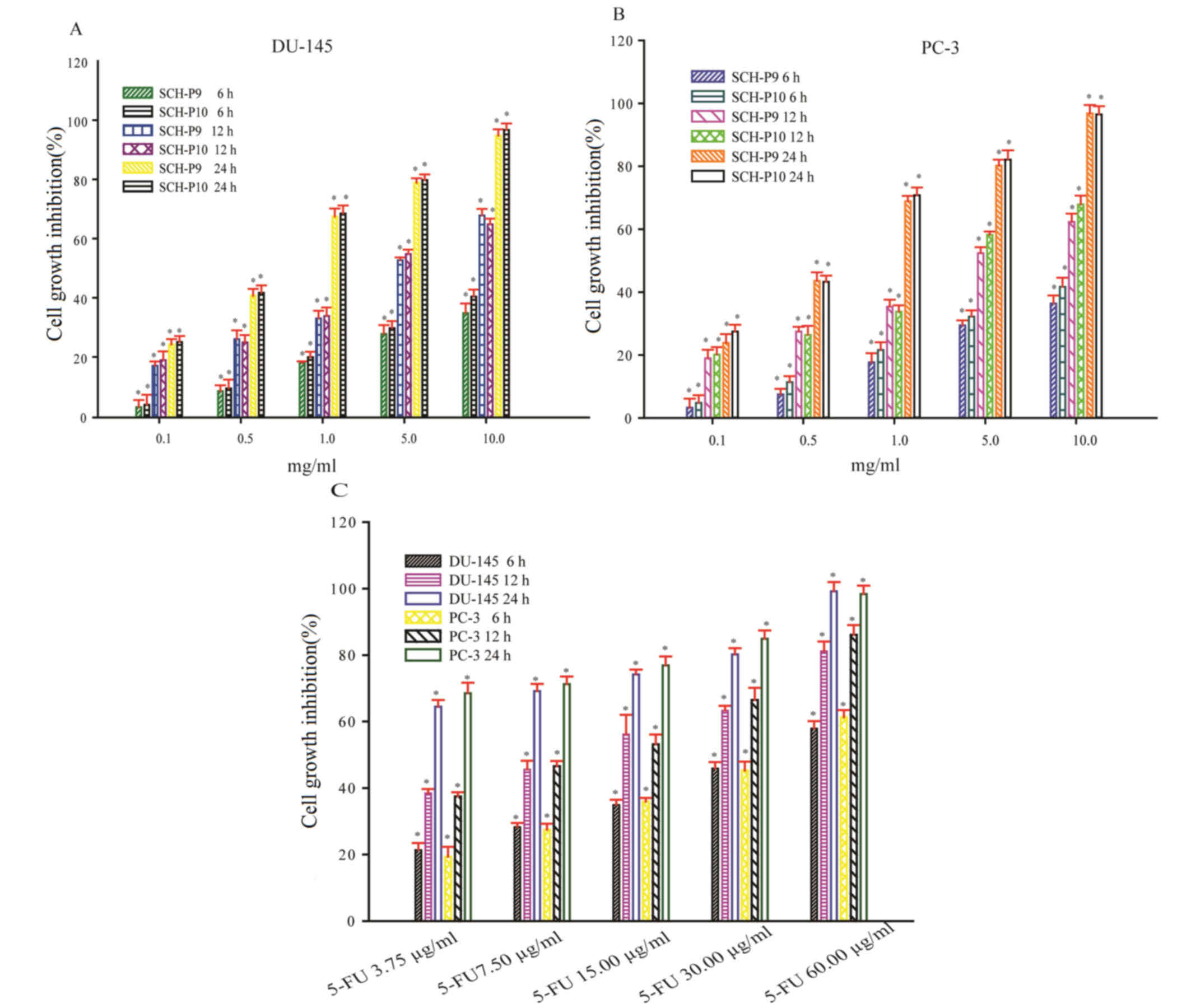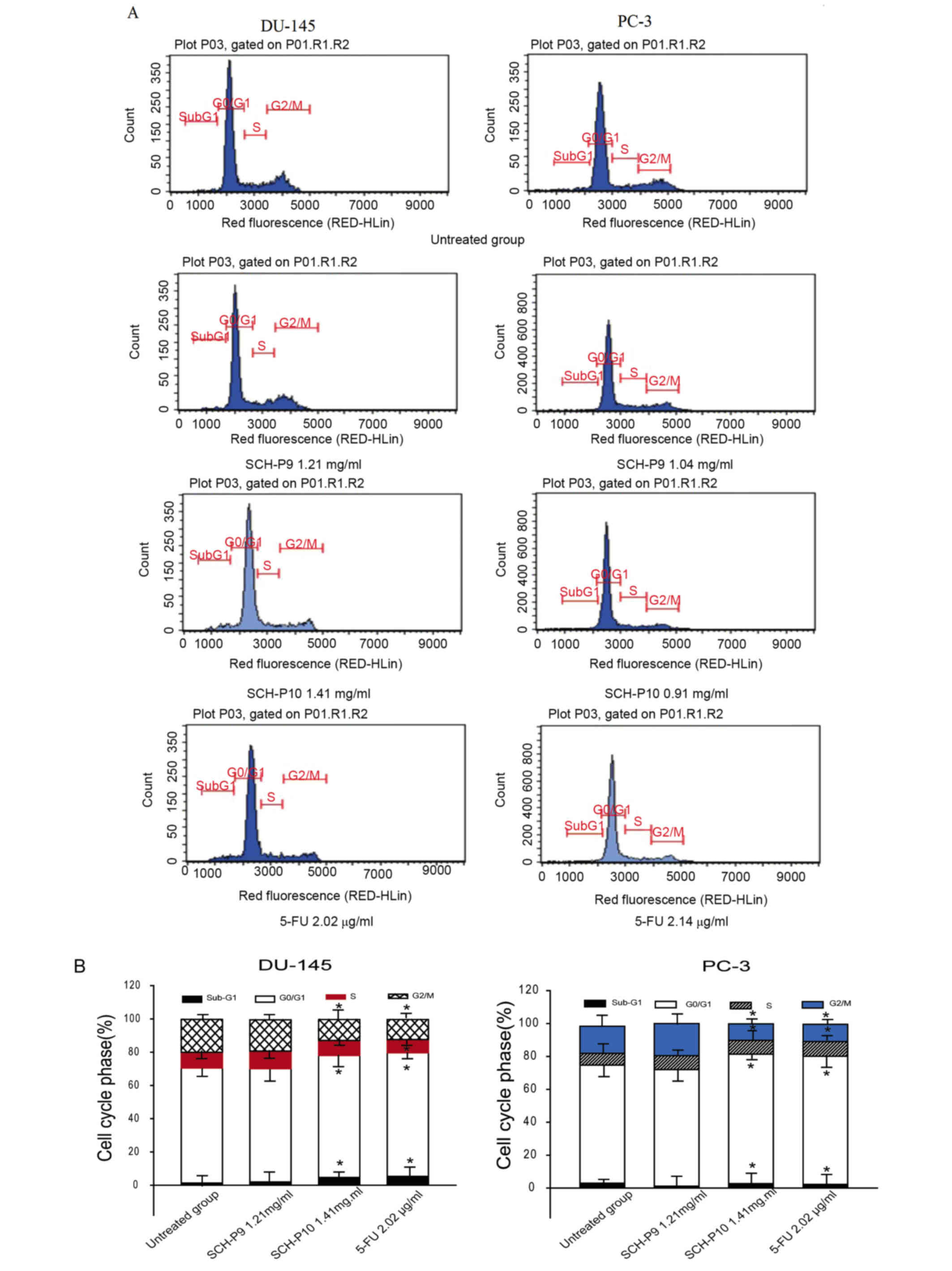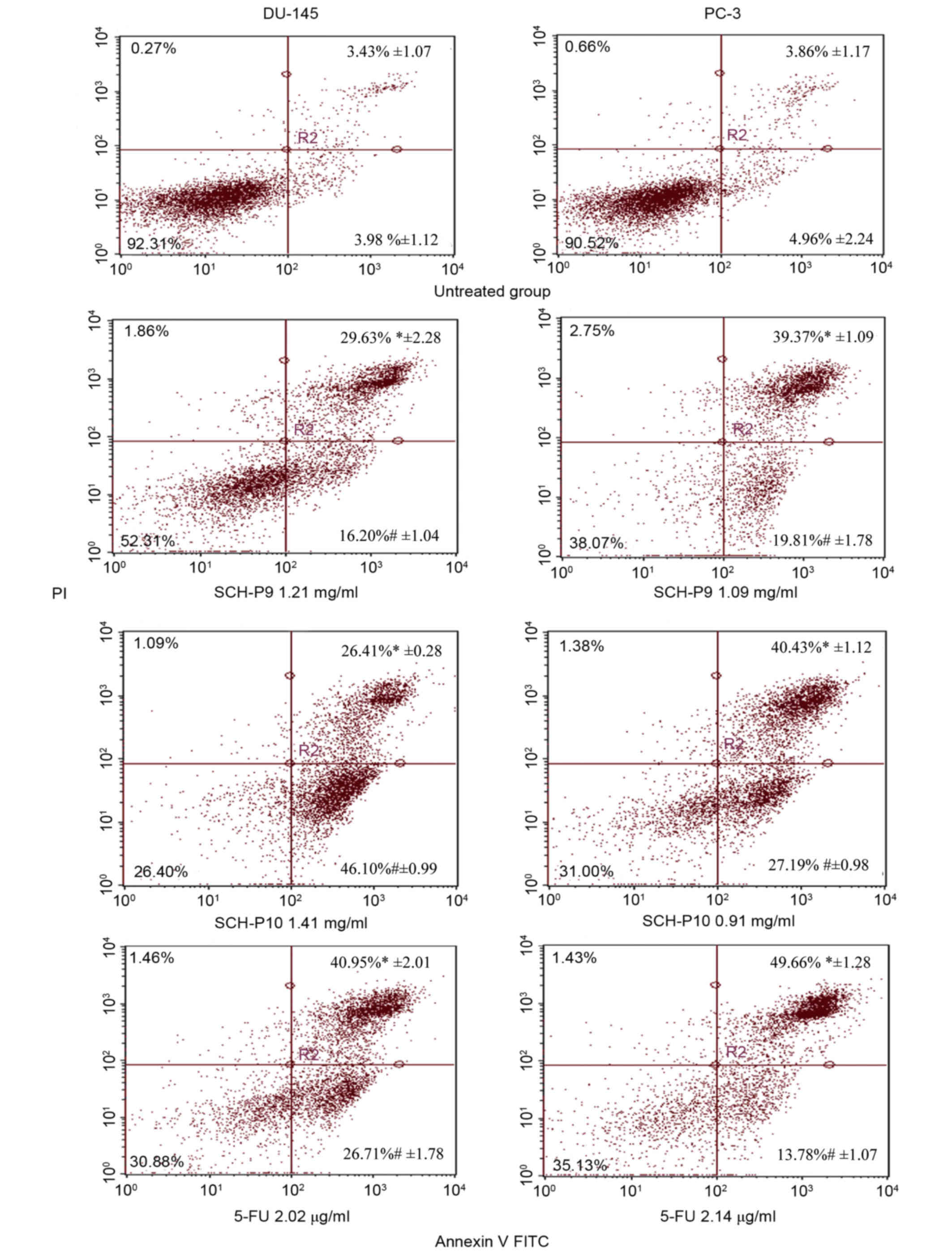|
1
|
Chakrabarti S, Jahandideh F and Wu J:
Food-derived bioactive peptides on inflammation and oxidative
stress. Biomed Res Int. 2014:6089792014. View Article : Google Scholar : PubMed/NCBI
|
|
2
|
Mora L, Aristoy MC and Toldrá F: Bioactive
Peptides in Foods. Encyclopedia Food Health. 1–400. 2016.
|
|
3
|
Udenigwe CC and Aluko RE: Food
protein-derived bioactive peptides: Production, processing, and
potential health benefits. J Food Sci. 77:R11–R24. 2012. View Article : Google Scholar : PubMed/NCBI
|
|
4
|
Pan WR, Chen PW, Chen YL, Hsu HC, Lin CC
and Chen WJ: Bovine lactoferricin B induces apoptosis of human
gastric cancer cell line AGS by inhibition of autophagy at a late
stage. J Dairy Sci. 96:7511–7520. 2013. View Article : Google Scholar : PubMed/NCBI
|
|
5
|
Wong MC, Goggins WB, Wang HH, Fung FD,
Leung C, Wong SY, Ng CF and Sung JJ: Global Incidence and Mortality
for Prostate Cancer: Analysis of Temporal Patterns and Trends in 36
Countries. Eur Urol. 70:862–874. 2016. View Article : Google Scholar : PubMed/NCBI
|
|
6
|
Siegel RL, Miller KD and Jemal A: Cancer
Statistics, 2016. Ca Cancer J Clin. 66:7–30. 2016. View Article : Google Scholar : PubMed/NCBI
|
|
7
|
Cheng L, Wang C, Liu H, Wang F, Zheng L,
Zhao J, Chu E and Lin X: A novel polypeptide extracted from Ciona
savignyi induces apoptosis through a mitochondrial-mediated pathway
in human colorectal carcinoma cells. Clin Colorectal Cancer.
11:207–214. 2012. View Article : Google Scholar : PubMed/NCBI
|
|
8
|
Huang TC, Lee JF and Chen JY: Pardaxin, an
antimicrobial peptide, triggers caspase-dependent and ROS-mediated
apoptosis in HT-1080 cells. Mar Drugs. 9:1995–2009. 2011.
View Article : Google Scholar : PubMed/NCBI
|
|
9
|
Wang C, Liu M, Cheng L, Wei J, Wu N, Zheng
L and Lin X: A novel polypeptide from Meretrix meretrix Linnaeus
inhibits the growth of human lung adenocarcinoma. Exp Biol Med
(Maywood). 237:442–450. 2012. View Article : Google Scholar : PubMed/NCBI
|
|
10
|
Lyu P, Zhang SD, Yuen HF, McCrudden CM,
Wen Q, Chan KW and Kwok HF: Identification of TWIST-interacting
genes in prostate cancer. Sci China Life Sci. 60:386–396. 2017.
View Article : Google Scholar : PubMed/NCBI
|
|
11
|
Chen W, Zheng R, Zhang S, Zhao P, Zeng H
and Zou X: Report of cancer incidence and mortality in China, 2010.
Ann Transl Med. 2:612014.PubMed/NCBI
|
|
12
|
Luesch H, Moore RE, Paul VJ, Mooberry SL
and Corbett TH: Isolation of dolastatin 10 from the marine
cyanobacterium Symploca species VP642 and total stereochemistry and
biological evaluation of its analogue symplostatin 1. J Nat Prod.
64:907–910. 2001. View Article : Google Scholar : PubMed/NCBI
|
|
13
|
Damiani RM, Moura DJ, Viau CM, Caceres RA,
Henriques JA and Saffi J: Pathways of cardiac toxicity: comparison
between chemotherapeutic drugs doxorubicin and mitoxantrone. Arch
Toxicol. 90:2063–2076. 2016. View Article : Google Scholar : PubMed/NCBI
|
|
14
|
Mader JS, Richardson A, Salsman J, Top D,
de Antueno R, Duncan R and Hoskin DW: Bovine lactoferricin causes
apoptosis in Jurkat T-leukemia cells by sequential permeabilization
of the cell membrane and targeting of mitochondria. Exp Cell Res.
313:2634–2650. 2007. View Article : Google Scholar : PubMed/NCBI
|
|
15
|
Okumura K, Itoh A, Isogai E, Hirose K,
Hosokawa Y, Abiko Y, Shibata T, Hirata M and Isogai H: C-terminal
domain of human CAP18 antimicrobial peptide induces apoptosis in
oral squamous cell carcinoma SAS-H1 cells. Cancer Lett.
212:185–194. 2004. View Article : Google Scholar : PubMed/NCBI
|
|
16
|
Saadi S, Saari N, Anwar F, Hamid AA and
Ghazali H Mohd: Recent advances in food biopeptides: Production,
biological functionalities and therapeutic applications. Biotechnol
Adv. 33:80–116. 2015. View Article : Google Scholar : PubMed/NCBI
|
|
17
|
Zheng L, Lin X, Wu N, Liu M, Zheng Y,
Sheng J, Ji X and Sun M: Targeting cellular apoptotic pathway with
peptides from marine organisms. Biochim Biophys Acta. 1836:42–48.
2013.PubMed/NCBI
|
|
18
|
Song R, Wei RB, Luo HY and Yang ZS:
Isolation and identification of an antiproliferative peptide
derived from heated products of peptic hydrolysates of half-fin
anchovy (Setipinna taty). J Functional Foods. 10:104–111. 2014.
View Article : Google Scholar
|
|
19
|
Sato S, Ohta K, Kojima K, Kozeki Ohmachi
and Yoshida T: Isolation and characterization of two types of
xyloglucanases from a phytopathogenic fungus, Verticillium dahliae.
J App Glycoscience. 9:110–112. 2016.
|
|
20
|
Singh BP, Vij S and Hati S: Functional
significance of bioactive peptides derived from soybean. Peptides.
54:171–179. 2014. View Article : Google Scholar : PubMed/NCBI
|
|
21
|
Kim EK, Kim YS, Hwang JW, Lee JS, Moon SH,
Jeon BT and Park PJ: Purification and characterization of a novel
anticancer peptide derived from Ruditapes philippinarum. Pro Bioch.
48:1086–1090. 2013. View Article : Google Scholar
|
|
22
|
Kim EK, Joung HJ, Kim YS, Hwang JW, Ahn
CB, Jeon YJ, Moon SH and Park PJ: Purification of a novel
anticancer peptide from enzymatic hydrolysate of Mytilus coruscus.
J Microbiol Biotechnol. 22:1381–1387. 2012. View Article : Google Scholar : PubMed/NCBI
|
|
23
|
Ke-Han XU, Shen XR and Chen GH:
Angiotensin I-converting enzyme (ACE) inhibitory activity of
enzymatic hydrolysate from three-spot hippocampus. Sci Technol Food
Industry. 36:96–99. 2015.(In Chinese).
|
|
24
|
Vermeirssen V and Jon JV: Verstraete:
Fractionation of angiotensin I converting enzyme inhibitory
activity from pea and whey protein in vitro gastrointestinal
digests. J Sci Food Agr. 85:399–405. 2005. View Article : Google Scholar
|
|
25
|
Zhu Z, Qiu N and Yi J: Production and
characterization of angiotensin converting enzyme (ACE) inhibitory
peptides from apricot (Prunus armeniaca L.) kernel protein
hydrolysate. Eur Food Res Technol. 231:13–19. 2010. View Article : Google Scholar
|
|
26
|
Huang F, Yang Z, Yu D, Wang J, Li R and
Ding G: Sepia ink oligopeptide induces apoptosis in prostate cancer
cell lines via caspase-3 activation and elevation of Bax/Bcl-2
ratio. Mar Drugs. 10:2153–2165. 2012. View Article : Google Scholar : PubMed/NCBI
|
|
27
|
Song R, Wei RB, Luo HY and Yang ZS:
Isolation and identification of an antiproliferative peptide
derived from heated products of peptic hydrolysates of half-fin
anchovy (Setipinna taty). J Func Foods. 10:104–111. 2014.
View Article : Google Scholar
|
|
28
|
Jumeri and Kim SM: Antioxidant and
anticancer activities of enzymatic hydrolysates of solitary
tunicate (Styela clava). Food Sci Biotechnol. 20:10752011.
View Article : Google Scholar
|
|
29
|
Watts KR, Morinaka BI, Amagata T, Robinson
SJ, Tenney K, Bray WM, Gassner NC, Lokey RS, Media J, Valeriote FA
and Crews P: Biostructural features of additional jasplakinolide
(jaspamide) analogues. J Nat Prod. 74:341–351. 2011. View Article : Google Scholar : PubMed/NCBI
|
|
30
|
Pettit GR, Kamano Y, Fujii Y, Herald CL,
Inoue M, Brown P, Gust D, Kitahara K, Schmidt JM, Doubek DL and
Michel C: Marine animal biosynthetic constituents for cancer
chemotherapy. J Nat Prod. 44:482–485. 1981. View Article : Google Scholar : PubMed/NCBI
|
|
31
|
Jiménez-Colmenero F: Potential
applications of multiple emulsions in the development of healthy
and functional foods. Food Res Int. 52:64–74. 2013. View Article : Google Scholar
|















